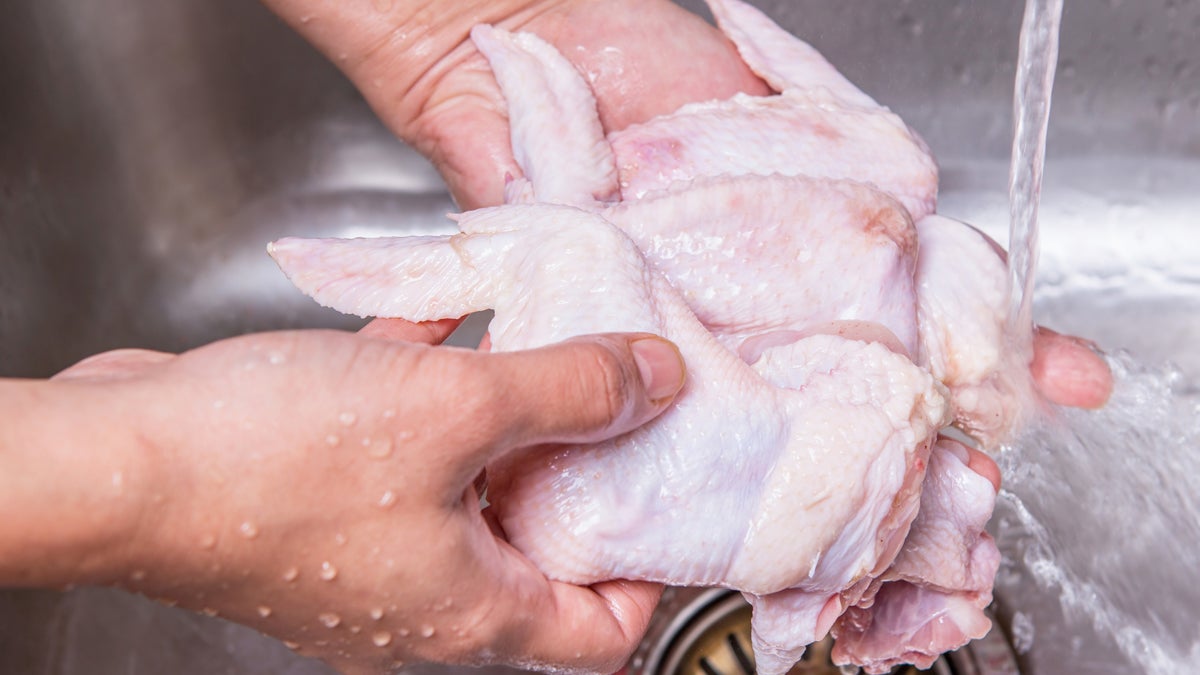Think twice before bathing that Thanksgiving bird
Listen Photo via ShutterStock) " title="chicken1200" width="1" height="1"/>
Photo via ShutterStock) " title="chicken1200" width="1" height="1"/>
(Photo via ShutterStock)
Heat at the proper temperature is what kills pathogens and makes meat safe to eat.
A couple of years ago, food safety experts launched a public service campaign telling people “Don’t wash your chicken.” Some home cooks balked.
“Apparently there are people who really want to wash their chicken,” said Jennifer Quinlan, an associate professor of nutrition sciences at Drexel University’s College of Nursing and Health Professions.
“This dug in group said: ‘I’ve been doing it for 30 years this way, I’m not going to stop, how dare you?'”
Cooks tell her they use vinegar, lemon juice–all sorts of concoctions–to rinse poultry. Those techniques don’t actually kill bacteria. Heat at the proper temperature is what kills pathogens and makes meat safe to eat.
Restaurants often get the blame when people get a touch of food poisoning, but sometimes cross-contamination happens at your own kitchen sink. Washing poultry ups the chance that salmonella or campylobacter carried along in a mist of water and chicken juice will splash onto kitchen counters or cross-contaminate nearby food.
Quinlan says food labels haven’t caught up with advice from the U.S. Department of Agriculture. Some packaging still suggests that you rinse a whole bird.
Her husband was solo recently and sent her a cell-phone picture of the cooking instructions on a broiler chicken.
“I said: ‘But you didn’t rinse it did ya?’ He said, ‘well, yeah.’ I said: ‘But you live with the woman who tells people not to wash their chicken.'”
After a small education campaign in Philadelphia, the Drexel researchers found improvements in people’s knowledge about safe poultry prep. But early evidence suggests that among those people ‘in the know’ the vast majority continue to rinse their chickens. Changing kitchen habits may require hands-on education and cooking demonstrations.
Maybe Quinlan gets pushback because she’s a food microbiologist and not a chef. But she is a mom.
“I have cooked turkey for the last two Thanksgivings without rinsing it, and nobody said: “This turkey tastes unwashed,'” she said.
Lots of people take their bird to the sink for a bath. Way back when, Julia Child did it.
Bossy, foul-mouthed YouTube sensation Auntie Fee, who teaches people how to cook on a budget, rinses her chicken, too. Warning: explicit language.
John Blanchet is a private chef in suburban Philadelphia with extra training from ServSafe, a National Restaurant Association food handling course.
He keeps poultry in a plastic bag, then moves it directly to a cutting board or pan when he’s ready to season and cook.
“The holidays and what we love about them have to do with tradition and memory, and sometimes science flies in the face of what Grandma used to do, and so that can be tricky for people,” Blanchet said.
Sure, love your grandma. But Blanchet says we should trust the food scientists.
Raw chicken “grosses” people out but if a tasty bird is your goal, don’t wash those yellow globs down the sink, he said.
“Fat is flavor, fat is an important part of skin and crisping, so when you feel waxiness on the outside of your bird, that’s not a bad thing,” Blanchet said.
Blanchet’s other Thanksgiving Day food safety advice is to cook stuffing separately, not inside the cavity of the bird.
“If any juices of the bird soak into your stuffing then that represents bacteria, potentially that needs to be brought above 160 degrees,” he said.
Other than that, “Get it seasoned, get it cooking, as long as it’s not overcooked, it will be delicious.”
Chef Blanchet recommends brining too.
WHYY is your source for fact-based, in-depth journalism and information. As a nonprofit organization, we rely on financial support from readers like you. Please give today.



